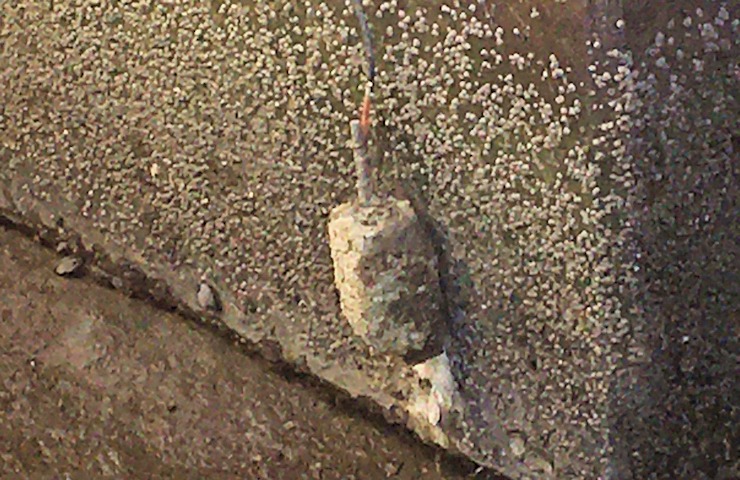
One of the major topics of discussion during the “What the Hull” panel portion of the FHA Annual Meeting involved the use of zinc anodes to reduce electrolysis, which can cause chemical decomposition of ferro-cement hulls. The consensus was that zinc anodes have limited effectiveness as currently deployed.
Maritime engineer Darrell Parker provided some background on fighting electrolysis. “We have a fairly electrically live marina here with all the power cables in the water,” he explained, adding: “There should only be two metals in a hull: the anode and the cathode. The cathode is the rebar, which you want to save; the anode is the sacrificial component of the setup.” In other words, anodes of zinc or other metals absorb electrical impulses before they can penetrate the concrete and damage a hull.
Ferro-cement barge builder Ian Moody said, “Zinc is the best metal as a sacrificial anode but you need a lot of them and they also need to be attached positively to any piece of metal. Generally, a zinc anode is good for about 10-12 feet of protection, so it’s kind of a decreasing radius of effectiveness. Zinc anodes that go on older barges protect just one bar of rebar, the one they are connected to. If you built a barge from scratch and welded every joint together, then it might be effective. You can hang a piece of zinc in the water and it will disintegrate if it’s attached to nothing. The corrosion of the zinc is not protective. One bar is all it will protect.”
Darrell Parker agreed: “For the zincs to be effective, they should be built in from day one to the rebar and we need more of them—more points where the zincs are attached—and then they’d be extremely effective. And even if there was micro-cracking that allows water to penetrate to the rebar, the secondary resting structure of the hull, it would actually protect the rebar and stop it from decoupling from the concrete.”
True to their name, sacrificial anodes have a limited service life, and hull repair contractor Robert Morgan cited anecdotal evidence that when they’ve ceased to function properly, they may wind up doing more harm than good: “On several occasions where the zincs have completely disappeared, the cable hanging in the water seems to be associated with damage to that hull. It would make sense that the seawater surrounding the houseboats can be electrically ‘hot’ and the cable that’s going into the seawater and up to the hull could be, in fact, a conduit for electrical-chemical forces that can deteriorate the hull more rapidly than if it wasn’t there. If you do have an exhausted anode, tie the cable up and get it out of the water. You don’ t have to remove it.”
In coming weeks we’ll be reporting on other topics covered during the panel discussion and answering some questions that weren’t addressed during the annual meeting.